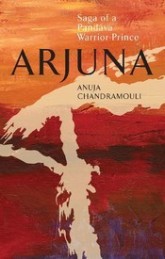Mahabharata is a fascinating, mammoth work of fiction with millions of sub-plots. Personally I have found Mahabharata much more intriguing than Ramayana. The sheer amount of conflicts, latent themes and contradictions engage your mind in constant debate. (The only other book that has turned over my mind such is perhaps Wuthering Heights.) No wonder dozens of variants and narratives for the same story exist. Not only variants, the whole saga has been written from perspective of so many characters such as Draupadi (The Palace of Illusions), Duryodhana (Mahabharta ki ek saanjh), Karna (Karna ki atamkatha), Bhima (Randamoozham) and so on. Arjun is a similar attempt with the third Pandava prince, Arjuna in focus (notice I do not say Arjuna’s perspective). This means, story of five brothers will be told closely as well. Even with five different personalities, the five brothers presented a single entity as Pandavas. Panchali only solidified that unit.
The language of the book is simple and does not draw away from the story, and often it feels as if this book is a collection of parables. I treated this book as a refresher of all the stories I have read before in Mahabharata. Also, book doesn’t always attempt to present the events in chronology, however, the way it was presented, I assumed that it was expected that readers are familiar with Mahabharata. This, though I gather may have been intentional on author’s part, was a mild irritant to me. In terms of narrating history and choices of sub-plots with Arjuna as focus, the book has been successful. However, did it provide occasions to pause and debate or throw a light on a philosophical perspective, or bring out innermost conflicts of Arjuna (other than those well-known at battlefield)? In that, book is wanting. Other than few notions of Arjuna – his arrogance that humanizes him, his mild indignation at what he thinks is Bhima’s naivety, and lastly, his belated realisation of everlasting love for Draupadi – Arjuna remains same character that we knew him from our earlier reads. Book doesn’t conjure anything new in in our minds. For example, Mahabharat ki ek saanjh is compelling in presenting an argument from Duryodhan’s perspective. But then, as I clarified, it is not really a perspective book. It is a re-telling, where Arjuna lies at the crux of it. It is fast read and worth a trip down the memory lane of your favorite epic.
where Arjuna lies at the crux of it. It is fast read and worth a trip down the memory lane of your favorite epic.
P.S: 1. I noted a disconcerting gender usage. When Arjuna hits Duryodhan in his nails in the battle, he ‘cries like a girl’. Oh, no.
2. It was a relief to once again read a mythology book where the characters did not say, ‘hell, yeah’. Touche! 😉 Also, unlike last few review copies I read, the editing was decent and I didn’t not find any of those punctuation issues that are eye sores when reading a book.











I fail to understand why girls are stereotyped everywhere so! http://www.indiabookstore.net/bookish/is-there-a-gender-bias-in-publishing/ hmmm